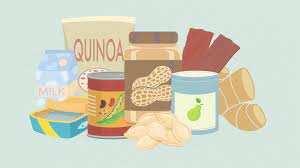In times of crisis, having a well-prepared pantry can offer peace of mind and ensure you have vital sustenance when it’s most needed. Whether it’s a natural disaster, power outage, or unexpected event, having an assortment of foods readily available can make a significant difference. Here are 15 essential emergency foods that you should consider having in your pantry.
1. Canned Goods: Canned vegetables, fruits, beans, and soups are non-perishable and rich in nutrients, offering vital vitamins and minerals during emergencies.
2. Dried Fruits: Dried fruits are compact, lightweight, and provide a natural source of energy. They make for excellent snacks or can be added to cereals and oatmeal.
3. Nut Butters: Nut butters like peanut butter and almond butter are packed with protein and healthy fats. They’re versatile and can be spread on crackers, bread, or fruits.
4. Rice and Pasta: Dry rice and pasta are staples that are easy to cook. They’re filling and can be combined with canned vegetables and sauces for well-rounded meals.
5. Cereal and Granola Bars: Cereal and granola bars are convenient for quick energy boosts. Opt for options with whole grains and minimal added sugars.
6. Canned Protein: Canned meats like tuna, salmon, and chicken offer ample protein. They can be included in salads, sandwiches, or pasta dishes.
7. Shelf-Stable Milk: Shelf-stable milk or milk alternatives can be used for cooking, cereal, or beverages. They don’t require refrigeration until opened.
8. Crackers and Whole Grain Bread: Crackers and whole grain bread are versatile essentials that can be paired with spreads, cheese, or canned items.
9. Instant Soup Mixes: Instant soup mixes provide warmth and comfort during emergencies. Opt for low-sodium varieties for better health.
10. Oats: Oats are versatile and can be used for oatmeal, baking, or as a base for energy bars.
11. Seeds and Nuts: Seeds and nuts offer protein, healthy fats, and fiber. They’re ideal for snacking or adding to meals.
12. Honey or Maple Syrup: Natural sweeteners like honey or maple syrup can enhance flavor and sweeten beverages or foods.
13. Dehydrated Vegetables: Dehydrated vegetables retain nutrients and can be rehydrated for soups, stews, or side dishes.
14. Canned Grains: Canned grains like quinoa, lentils, and beans provide quick and nutritious plant-based protein and fiber sources.
15. Instant Coffee or Tea: Instant coffee or tea can offer comfort and a warm beverage option during challenging times.
Conclusion: Preparedness for emergencies encompasses more than physical safety; it also entails having sufficient food to sustain yourself and your loved ones. Stocking up on these essential emergency foods can offer nourishment, comfort, and a sense of readiness during unexpected circumstances. Regularly check expiration dates and rotate your supplies to ensure freshness and optimal readiness.








